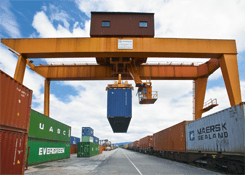RAILWAY SECTOR DECLARATION ON BOOSTING INTERNATIONAL RAIL FREIGHT
Today the rail sector and its customers, represented by CER, CLECAT, EIM, ERFA, ERTMS Users Group, ESC, UIP, UIRR, and UNIFE, and supported by the Rail Freight Corridors, presented a declaration at the TEN-T Days in Rotterdam, committing themselves to the aim of enhancing the competitiveness of the Rail Freight Corridors for the benefit of all customers, and to improving the quality, reliability and efficiency of transporting goods by rail across Europe.
The sector declaration complements the one presented by the Transport Ministers of the EU member states, and seeks to boost the development of rail freight transport. Both declarations were presented at the Business Conference on Rail Freight Corridors organised during the TEN-T Days in Rotterdam on 21 June 2016.
The sector declaration identifies important measures which are needed to improve the competitiveness of the Rail Freight Corridors in order to make rail freight a more attractive option for all customers, to enhance the operational efficiency of rail freight operators, and to ensure adequate capacity for all users. One such measure includes a single list of important operational issues to be resolved for improving international rail freight, updated annually by the advisory groups of railway undertakings, and proposed to rail freight corridors in order to support their action plan. Additionally, the corridors will continue providing and improving an adequate, generic and comparable set of key performance indicators (KPIs) on the quality of service at regular intervals, and in consultation with the stakeholders, taking into account already existing work carried out by the sector.
Finally, the rail sector associations have committed to report on the results of the actions agreed in the declaration on a regular basis.
All signatories of the declaration jointly state: "The sector declaration, in combination with the ministerial declaration, is an unprecedented effort to increase the competitiveness of international rail freight, unlocking its growth potential, and promoting rail's key role in a sustainable transport system. It shows that the European rail sector and member states are pulling together on the same string with a common goal in mind: boosting international rail freight for the benefit of the whole sector, particularly shippers and other end-users. All parties are committed to working together towards that goal."
